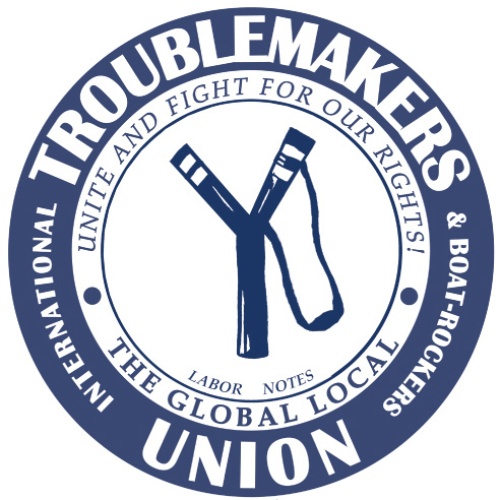Sexual harassment still 'normal' in low-wage jobs

By Jane Slaughter, Labor Notes
Since sexual harassment is about power, not sex, it's not surprising that low-wage women in lousy jobs get a lot of it. The Equal Employment Opportunity Commission says the restaurant industry is the largest source of sexual harassment claims. And the Coalition of Immokalee Workers (CIW) finds harassment of women farmworkers to be pervasive.
In a national survey of 4,300 restaurant workers by the worker center Restaurant Opportunities Centers United, more than one in 10 workers reported that they or a co-worker had experienced sexual harassment. ROC says even this creepy figure is likely an undercount.
Focus groups and interviews ROC conducted nationwide found sexual harassment an "accepted … part of the culture." One worker said, "It’s inevitable. If it's not verbal assault, someone wants to rub up against you."
RESOURCES FOR
WOMEN WORKERS
* Stopping Sexual Harassment, Labor Notes’ 1992 guide, is still one of the most complete manuals out there. It has sections on member-to-member harassment, women of color, defending yourself, the legal route, and "an unhelpful union." Order at labornotes.org/store.
* For a training on member-to-member harassment developed by the United Electrical Workers, including both racial and sexual harassment, click here.
* KC Wagner of the Worker Institute at Cornell University frequently does "train-the-trainer" workshops for unions, showing how to lead an interactive class on addressing and preventing sexual harassment, within the context of building union solidarity and promoting workplace respect. Contact her at kcw8@cornell.edu.
* The half-hour film "Union Women, Union Power: From the Shopfloor to the Streets" (available on YouTube), directed and produced by the Young Women's Committee of the Philadelphia Coalition of Labor Union Women (CLUW), highlights five union women and their fights for workplace democracy. The committee aims to use the film to introduce younger women to the labor movement, with women leaders as role models. Funding was provided by the Berger-Marks Foundation.
* The days are long past when the job of the union women's committee was to provide refreshments. A report from the Berger-Marks Foundation looks at what women's committees are doing today and what impact they have. Download Women's Committees in Worker Organizations: Still Making a Difference at bergermarks.org.
* You might not want to actually hand your mother a pretend check on Mother's Day, but the info on this site is interesting. The salary.com/mom-paycheck website breaks out the work hours of average moms at various tasks and calculates what they would get paid if they were being paid. Stay-at-home moms work an average of 94 hours a week and would collect a "mom salary" of $113,586 a year. Mothers with jobs do an average of 58 hours per week in household and childcare duties on top of their paid jobs.
—Labor Notes
ROC reviewed four years of EEOC sexual harassment settlements and verdicts in the restaurant industry and found that cases were filed primarily against well-known chains, including McDonald's (the worst with 16 percent of the cases), KFC, Sonic, IHOP, Applebee's, Cracker Barrel, Ruby Tuesday, and Denny's.
Most often, workers were abused and harassed daily and faced some form of retaliation for complaining.
Direct Intimidation
One farmworker described the norm in the fields similarly to that in restaurants: "You allow it or they fire you." A 2010 study of farmworker women found 80 percent had experienced sexual harassment at work.
Farmworker women can be especially vulnerable when they are employed and paid by individual crewleaders, who thus have tight control over their livelihoods.
One was fired along with her husband and son, and lost their company housing, after she complained to the company's human resources office of a crewleader's uninvited visits to her trailer after her husband had left for work. The crewleader was responsible for, and often withheld, her pay.
The Fair Food Code of Conduct CIW negotiated with Florida tomato growers and fast food chains enables CIW to set up worker-to-worker trainings that address sexual harassment on company time. A Know Your Rights booklet and video include a sexual harassment scenario scripted and acted by CIW members.
The Code has enforcement provisions, too. Sexual harassment that involves physical contact will cause curtailment of tomato purchases from participating growers for at least three months, unless the harasser is fired and other corrective action is taken.
In a report on its Fair Food Program for 2011-13, CIW reports two cases of growers who responded to removal or the threat of removal by firing abusive crewleaders and conducting trainings.
The April 4-6 Labor Notes Conference will include a workshop on sexual harassment as well as a women's caucus meeting. Register here.
Tags
Labor Notes
Labor Notes is a media and organizing project that has been the voice of union activists since 1979.
